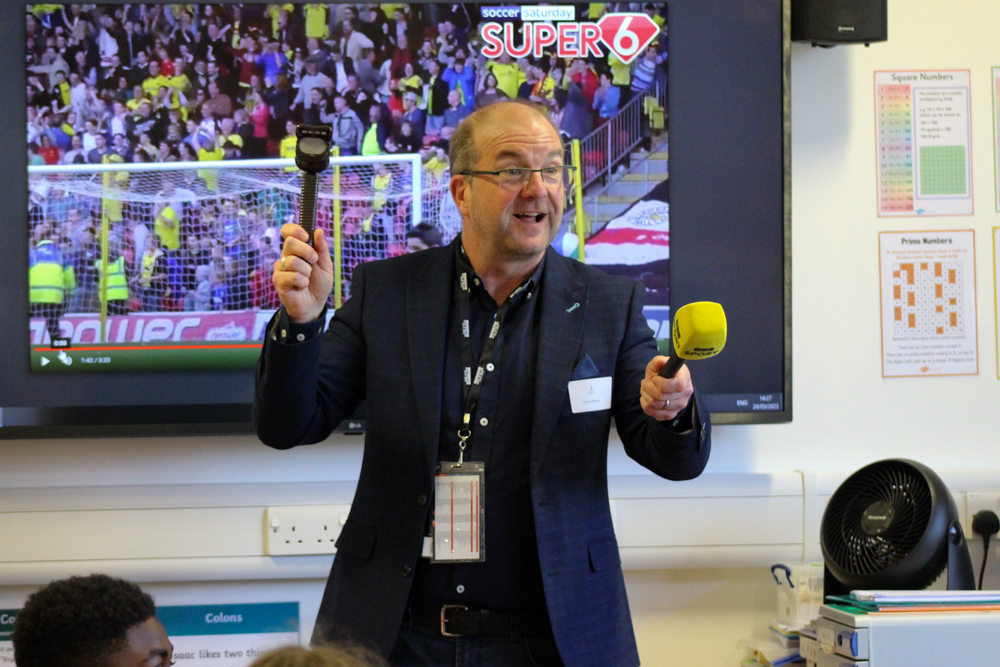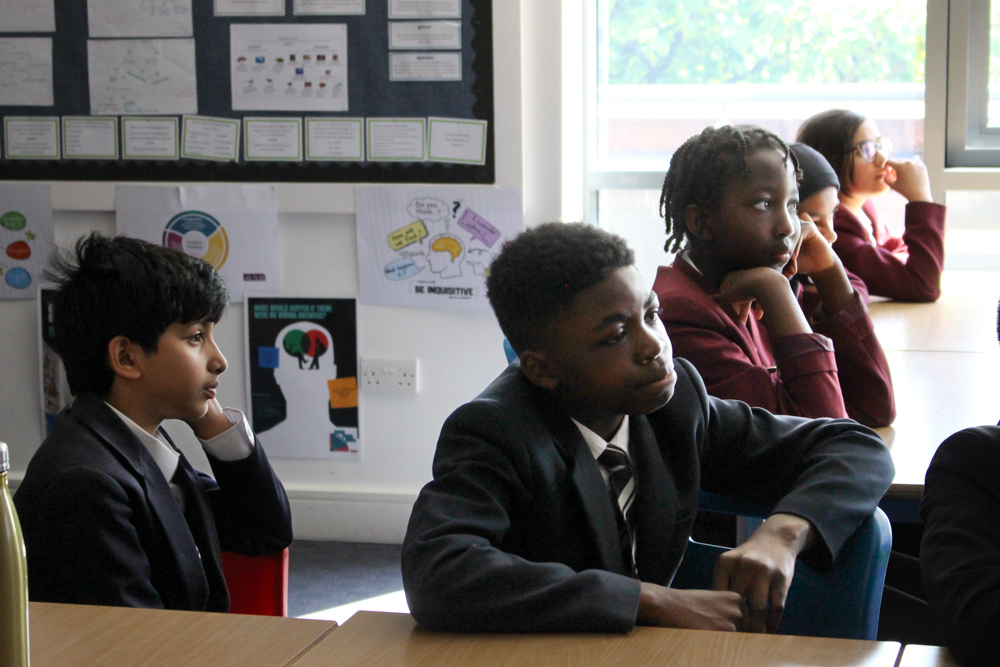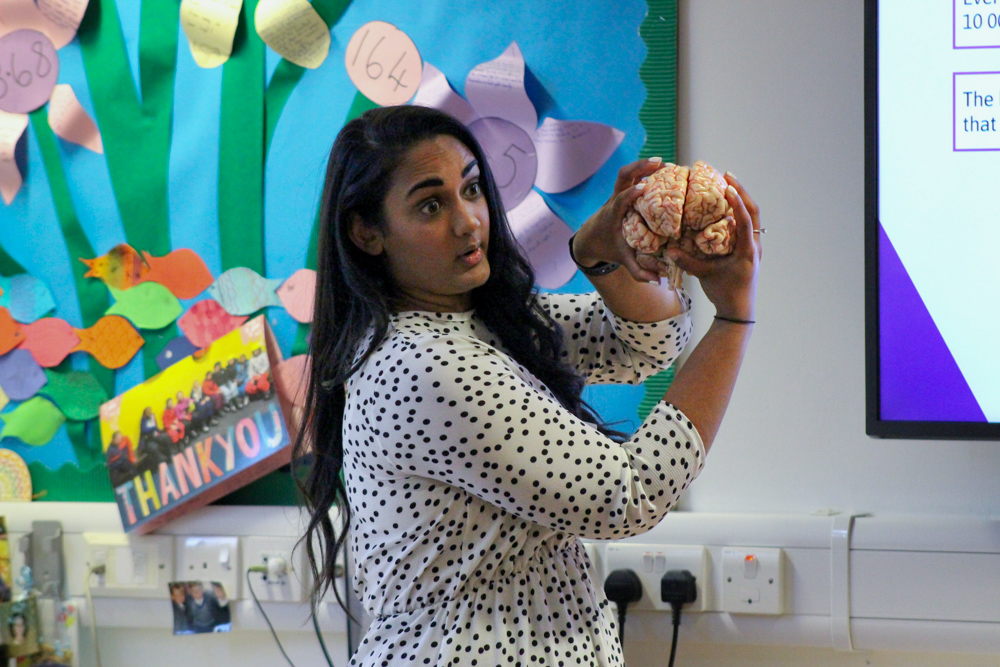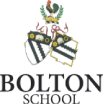
Primary Division boys and girls in Year 6 enjoyed the Careers Carousel. At this annual event, alumni return to Bolton School to share the world of work with Junior School pupils. The Junior Boys walked over to Hesketh House to join their Junior Girls’ School peers for four sessions across the afternoon.
Mobeen Qureshi (Class of 2009) talked to pupils about his work as a Trauma and Orthopaedic surgeon working in the North West. He described being a doctor as an opportunity to constantly learn new things, and said that, while that might not seem like a good thing to the Year 6s, he definitely sees it as a positive. He talked about how fulfilling he finds his career in medicine, as it allows him to help people, solve problems and constantly find challenge, but also described some of the disadvantages for his audience, such as frequent change, stress and long hours. He talked about what it means to be ‘on call’ for 24 hours.
Moving on to talk about his job more specifically, Mobeen showed some x-rays of fractures and breaks and handed around models of hand bones that had been pinned. He talked about some of the surgeries he frequently does, and even passed around a real ball joint used in hip replacements! The groups had plenty of questions about being a doctor, performing surgery and why he chose this career path. Mobeen attributed it to careers talks at Bolton School, as well as perhaps his mum’s influence!
He also briefly mentioned his recent appearance on the third series of the BBC’s ‘Race Across the World’, which saw him travel across Canada with his wife.
Alisha Patel (Class of 2011) shared her work as the Geoffrey Jefferson Brain Research Centre Manager. She asked each group what they know about the brain already before sharing a small selection of brain facts and sometimes going into more detail about what the boys and girls had said. She also explained that one in six people will have a brain disease at some point in their life, so it’s important to conduct research to help people to live longer and have a better quality of life with these conditions. However, as every person’s brain is different, with different connections, this can be challenging.
She talked also about research itself: what it is and why it’s needed. She then conducted a ‘double blind clinical trial’ by asking a teacher to hand out sweets, without the children knowing what colour they picked: this meant that she (the researcher) didn’t know what they had, and they didn’t know if they had the ‘medication’ or a placebo. She then eliminated each colour for various reasons that might crop up in a real-world trial, for example other medical conditions, until the children left standing were the ones who had the medication and it worked. Based on the percentage of the room still standing, she explained whether it would be a good idea to move on to a larger trial.
Dave Woods (Class of 1985) began his talk by sharing some of his ‘accreditations’ from various prestigious sporting events across the years with pupils. He then spoke about how he became the BBC's Rugby League Correspondent and covering the sport for BBC TV, BBC Radio and BBC Online. It all began when a teacher at Bolton School gave him a book by Keith Waterhouse: when he looked into the writer, he discovered that he was a journalist and, from then on, at the age of 16, he decided that was what he wanted to do. Though he had no connections in his family, he contacted the (then) Bolton Evening News Sports Editor to ask for help in becoming a sports journalist. With his help, Dave was able to get a job in journalism following his A Levels. He said to the Year 6 pupils that with the right attitude, aptitude and focus, they could do anything.
Though he started out writing stories for newspapers with an agency, after the sudden death of a colleague he was suddenly asked to cover Saturday football matches live on the radio! Though he was terrified, he did it and, after a few months, he started to enjoy it. Though he’d never considered it before, he realised that this was what he wanted to do. He therefore advised the boys and girls that they should face up to their fears, as they might discover a new passion.
Dave talked about how commentators can get to the heart of big sporting moments, even if they’re no good at playing themselves, and spoke a little about the different approaches to radio and television commentary.
Pupils also learned about skills and qualities with Miss Jones, the Head of Careers and Head of Business in the Girls’ Division. She introduced each group to hard skills, which can be taught and improved with practice, and soft skills, which are harder to teach and come more naturally to some than others. The boys and girls discussed the meanings of some different skills and Miss Jones encouraged them to think of different ways they might develop them: for example, the children suggested that leadership could be developed through sport or music.
The afternoon was a huge success and the Junior Boys and Junior Girls were excited to hear from this diverse group of alumni about the paths they had taken after leaving Bolton School.




















.jpg&command_2=resize&height_2=85)
.jpg&command_2=resize&height_2=85)






